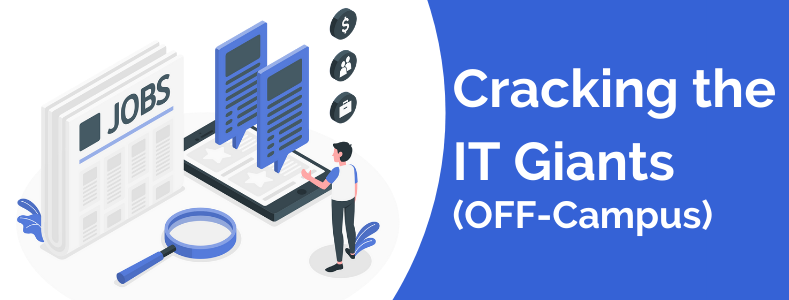
Introduction
Placement is like a hotcake, every one of us wants to grab the best one of it. But it’s never that easy to get your dream job. You are a lucky one if you get it on-campus, but going for off-campus is a 180-degree shift. For On-campus you merely compete with 300 or thousand students at most, but when it comes to off-campus you are competing with a whole crowd of thousands or maybe even lakhs! It's going to be a tough game to stand out in such a dense competition. But learning from the real-life experiences of an expert who has made his way to Microsoft, FlipKart, Oracle and his guidance can surely help you to get ready for your masterstroke. So here we bring a blog by Akash Bhayekar where he has shared his experiences of cracking various off-campus placements and guided the students.
Off-Campus Vs On-Campus
One key difference between off-campus and on-campus hiring is getting interviews. In on-campus, the college has already invited the companies for placements. You just need to qualify the criteria and clear interviews. Whereas in off-campus your first challenge is to get your resume shortlisted, you need to reach out to multiple companies, their HRs, apply on various job portals. This process itself takes time from applying on job portals to getting interviews scheduled. Even the ratio of applying to response is low, so you must apply as many as possible and focus on what responses you got and give your best shot.
A Profile to StandOut
As you won’t be having any prior work experience you need to show something valuable for companies other than college grades and assignments because, in off-campus, you will be competing with people from all over India, so you need to stand out. Here are few things you can do –
- Participate in various hackathons on Codechef, Hackerrank, HackerEarth.
- Participate in various enterprise challenges like Google CodeJam, ACM ICPC.
- Contribute to open-source projects on GitHub. Find some projects you like and contribute by solving just small bugs or adding a simple feature. This will also help you learn about how companies work.
- Build your own projects by finding out what you are passionate about, find problems around you and provide solutions to them.
- Showcase all these accomplishments on your resume and make your resume stand out.
A Quest for the Best
If you can get on-campus placement, that’s really a good option, but if you are looking for a particular field or company that doesn’t come to the college, you do a few simple things to apply off-campus.
- Start applying for jobs on LinkedIn, Naukri, Instahyre. Find out jobs with 0-1 year of experience or it is mentioned that it’s for the fresh graduates.
- Reach out to your recent college alumni for referrals if there are any open positions available in their company.
- Start participating in hiring oriented hackathons on HackerEarth.
- Connect with recruiters(HR) of the company on LinkedIn and reach out to them if any positions are available.
- Prepare well before starting any interviews.
A Skillset to stand Out
- Start competitive coding, participate in timed hackathons.
- Get your core skills strong in Data structures, algorithms, and Object-oriented programming. To get some hands-on build some projects around those topics.
- Solve interview questions on GeeksForGeeks and refer for the solutions if required (But avoid this as much as possible, read solutions only after you tried at least for few hours)
- Solve questions on Leetcode and always read the best solution after you have solved it. This will help you grow and learn.
- Do mock interviews with friends keeping the time constraint.
- Refer to book “Cracking coding interviews”. This book is the bible on how to prepare and perform interviews.
Each one, Different one
Every company has different work culture and subject matter expertise. You will always learn something or another from different companies whether it’s a tech giant or not. Focus on getting the experience that you desire, what kind of tech stack or field you want to work on, what kind of project you like to work on. Sometimes you learn more from start-ups than big companies. Don’t forget, every experience counts good or bad.
Give it a try!
- Reach out to people for help in finding a job, getting a referral or even a mentorship, don’t ever hesitate. If you try you may or may not succeed but if you don’t even, try then you will definitely not succeed.
- Give your 120% to the projects you work on. This applies even when you start working for an organization.
- Instead of focusing on 100 different things and not gaining any depth, focus on one thing and get expertise in it.
My Mentors
I didn’t get much mentorship or guidance in my time, but friends have always helped me grow in my career. The collective experience of people around you also acts as your north star. If you need mentorship, you can reach out to your seniors or alumni. Also, you can always learn from blogs and Youtube videos about their journey and work experience.
Common Mistakes we commit
This might not be a popular point of view but I feel that it is a mistake to give more importance to a specific part of the hackathon at the cost of another part of the hackathon. For example, if you try to rush the ideation phase or don’t discuss the tech stack and implementation clearly, it will only make the coding a lot more difficult. Another mistake in my opinion is to compromise on the presentation to get a few more lines of code in. It would be appreciated more if a team can clearly present the crux of their solution rather than making a haphazard presentation where it seems that a random set of features has been made into a project. Of course, the coding is extremely important but small things like clear documentation and proper git workflows can be highly appreciated and show that you tried to go one step beyond everyone else.
Some Interview Tips!
- Be vocal in interviews, keep talking about what you are thinking. Interviewers want to know how you think or you approach the problem.
- It’s not always about getting the perfect solutions, start with brute force and then build your way up to the efficient solution.
- Be honest on your resume and in interviews.
- While practising, it’s not important just to solve max questions but solve the quality questions and similar ones you should be able to figure out as you go.
- Get your fundamentals strong. There is no alternative to this.
- Don’t forget to ask about the company and the projects they work on at the end of the interviews.
